Eva Hnizdo's Blog, page 3
March 26, 2022
Yes, we should all be feminists.
 We Should All Be Feminists by Chimamanda Ngozi Adichie
We Should All Be Feminists by Chimamanda Ngozi AdichieMy rating: 5 of 5 stars
It was a long essay about the roles of men and women in society. Brilliant argumentation, nothing radical, just a lot of common sense. She writes non fiction as well as fiction.
View all my reviews
March 20, 2022
A messy copy and paste of my novel’s reviews.
I am trying to get a publisher for a Czech translation of my novel. In the meantime, I just thought I will put a summary of my book reviews. Not all of them are good, but, flatteringly, most of them are. Of course, this messy copy and paste is… well, messy. I hope you will forgive me. Visual presentation is not my forte, and I am probably ( or certainly) rather lazy. But you can always go to the amazon or other sited and read the reviews there. 
Reviews on my publisher’s site- Book Guild:
“Eva Hnizdo’s Why Didn’t They Leave illuminates the lives of one extended family from the beginning of Naziism. With meticulous detail and heart-wrenching scenes Hnizdo offers answers through her characters’ actions as to why some chose to remain in their homeland and others fled. A story filled with history and heartache… survival and hope.” – Julie Maloney, author and founder/director of Women Reading Aloud
“Eva Hnizdo has turned her own story into a gripping work of fiction that follows a secular Czech Jewish family’s fortunes during World War Two through communism to a multi-cultural life in Britain. Her book says much about prejudice and tolerance, survivors’ guilt and the emotional challenges of motherhood, all through the voice of her extrovert and sexy heroine.” – Brigid Grauman, journalist and author of Uncle Otto’s Puppet Theatre
“Zuzana is haunted by the choices that her family made during the Nazi invasion of Czechoslovakia and later during the Communist regime. Her discoveries make for a compelling story of loyalty, love, and courage.” – Jacqueline Sheehan, author
Aria H. NetGalley Reviewer (Guest Review) – 26 Oct, 2021
This is such a beautiful book that follows a jewish family from Czechoslovakia being persecuted by both the Nazis and the communists. It was a heartbreaking and hopeful story that I simply could not put down. It was breathtaking. I loved it.
Original review: https://www.netgalley.co.uk/book/237787/review/865607
Petr Balajka (Guest Review) – 07 Feb, 2022 the Czech test is a translation of his review on Amazon France.
This very readable story of a Jewish family from Czechoslovakia uses the personal story of a young girl Zuzana to tell the history of the Jews from the Second World War, which brought disaster to her family, through life in communist Czechoslovakia to her decision to emigrate, i.e. to live freely in England and at the same time to escape the influence of her mother.
Eva Hnizdo obviously draws on her family history, but also adds to the reality in a way that creates a plastic, appealing story. Her focus is not just on the Holocaust and post-war totalitarianism, but on everyday life, family relationships, and the exploration of Jewish identity. Once the protagonist, Susan, is in England, other weighty themes enter the book, such as the integration of immigrants into local society, issues of national ethnicity and multiculturalism.
Velmi čtivý příběh židovské rodiny z Československa líčí na osobním osudu mladé dívky Zuzany historii Židů od druhé světové války, která přinesla i její rodině katastrofu, přes život v komunistickém Československu až po její rozhodnutí emigrovat, tedy žít svobodně v Anglii a zároveň se vymanit z vlivu své matky.
Eva Hnizdo čerpá evidentně jak z rodinné historie, tak realitu autorsky dotváří, aby vznikl plastický přitažlivý příběh. V centru její pozornosti není jen holocaust a poválečná totalita, ale všední život, rodinné vztahy, poznávání židovské identity. Jakmile je hlavní hrdinka Zuzana dostane do Anglie, do knihy vstupují další závažná témata jako začlenění emigrantů do místní společnosti, otázky národnostních etnik a multikulturalismu.
Amazon France
Commentaire client
[image error]5,0 sur 5 étoiles Why didn’t they leave?
Commenté en France le 7 février 2022
This very readable story of a Jewish family from Czechoslovakia uses the personal story of a young girl Zuzana to tell the history of the Jews from the Second World War, which brought disaster to her family, through life in communist Czechoslovakia to her decision to emigrate, i.e. to live freely in England and at the same time to escape the influence of her mother.
Eva Hnizdo obviously draws on her family history, but also adds to the reality in a way that creates a plastic, appealing story. Her focus is not just on the Holocaust and post-war totalitarianism, but on everyday life, family relationships, and the exploration of Jewish identity. Once the protagonist, Susan, is in England, other weighty themes enter the book, such as the integration of immigrants into local society and the like, issues of national ethnicity and multiculturalism.
ywanderingreads’s Reviews > Why didn’t they leave?
[image error]ywanderingreads’s review
Dec 05, 2021
liked it
bookshelves: net-galley-2021, 2021-reads
This story started out very interesting for me but it kind of dragged on towards the end. I felt some parts were unnecessary and it seems to take away the essence of the story which is a shame cause I really enjoyed the premise of the story.
The main character, nineteen year old Zuzana, learnt that she was Jewish when she visited a synagogue with her family and they began looking for names of their lost relatives. She felt betrayed her mother, Magda, never told her but she didn’t understand what her family went through during the Holocaust. Magda only wanted her to have a better life. Zuzana never got along with Magda and she isn’t always the best mother but they learnt to tolerate each other as best as they could.
I loved reading about Zuzana’s family history and what her family went through. Hnizdo takes us back in time when the Nazis invaded Czechoslovakia in 1939. She takes us through three generations of this Czech Jewish family, why some chose to stay and why some chose to leave. We learned what happened to those who survived the Holocaust and how the trauma had affected their lives over the years.
More than that, Hnizdo also wrote about the strained relationship between Magda and Zuzana. She eventually left the clutches of her mother and seek for a better life in the UK. Zuzana tried hard to rediscover herself and uncover all that she didn’t know by reconnecting with lost family members.
I may not have enjoyed this story as much, but I would still recommend giving this story a go if you enjoy historical fiction and family stories that spans generations. Thank you Netgalley and The Book Guild for the arc.
AMAZON USA
[image error]4.0 out of 5 stars An important story for today
Reviewed in the United States on October 15, 2021
Verified Purchase
Why didn’t they leave by Eva Hnizdo tells the story of a Czech family from the point of view of Magda and her daughter Zuzana, moving between the two women and covering most of their lives.
Magda in the 1930’s is a willful somewhat spoiled child living in a beautiful home in Prague. Her mother Franzi is a cultured woman and grandmother Olga is a steel-willed Matriarch used to getting her way.
They’re wealthy and the family is educated, close, and enjoys a privileged lifestyle. They’re Jewish but agnostic and celebrate Christmas with roast pork and have no discernible religious beliefs.
There are rumblings of trouble in Europe but family matriarch Olga dismisses it and even though the opportunity to leave and emigrate to the United States comes their way—enough so that much of the family could go—only a few go against grandmother Olga’s command and leave.
Though the family barely considers themselves Jewish, in fact some are married to Christians and even a German, it’s enough Jewishness for the Nazi’s. They’re sent to camps, most of the men die, in fact most of the family dies. (I heard the author speak im an interview with the BBC about this book and her family history upon which this story is based. She made an intriguing statement that how we see ourselves is important, but how others see us too is also important. That really stayed with me.)
Those that survive in this story are changed forever. Magda at 18 returns from a camp determined to put it behind her, she finishes school quickly and becomes a pharmacist. She trusts no one and is damaged by what she endured. Her mother Franzi too survives but decides the worst in life is behind her and focuses on the good. Olga too managed to survive but with the knowledge that her family died because of her demands.
The Nazis confiscated much of their wealth but some things were saved by non-Jewish friends.
Magda marries and has a daughter Zuzana. Zuzana doesn’t even know her family is Jewish because Magda like many survivors of the Holocaust decides the safest way to ensure future survival is to leave every last hint of their Jewishness behind them so she hides everything from her daughter.
Zuzana knows only that her mother is demanding and impossible. Prague and Czechoslovakia are then invaded by Russia and becomes communist. So the surviving family goes from Nazis to Communism.
Zuzana slowly learns her family’s truth though her mother shares nothing. When grandmother Franzi dies, Magda has the funeral behind Zuzana’s back.
Magda manages to secure state permission for a trip to Paris and Zuzana takes her first opportunity to escape to London and never return. Determined not to make the same mistakes as her family.
Zuzana is pragmatic and open to new cultures and races, surprisingly unlike her mother Magda who is still living in survival mode. Zuzana escapes communism to the west. She marries a black man whose family emigrated from Grenada. Slowly over the years Zuzana pieces together her family story. It’s a fascinating tale and an education for many Americans whose own families escaped many of the horrors of the Second World War—and the ensuing political problems of the decades following even to now.
This book is important and worth your time and effort. The large cast of characters at the beginning gives the story a slow start but the payoff is huge. It’s amazing how much of this history is repeating itself even today.
5.0 out of 5 stars Unites you with history and the human spirit.
Reviewed in the United States on October 4, 2021
Verified Purchase
This is a powerful story of the family complexities of emigration in face of one of the most evil times in human history. The ancestral strings and the form of family trees that Eva Hnizdo took to write of the Jewish family experience throughout Hitler’s reign of terror was something I appreciated very much.
Mother-daughter and family matriarchy plot lines pulled me into each character’s life as they lived it and found me “putting myself in their shoes” whether standing huddled on the transport platform or reffing a mother-daughter banter and communication barrier.
The historical sequences that led up to Hitler’s Final Solution played all the while accurately in the background, while the characters captured your heart in their uprooted lives. I bought this book because of it’s title: Why Didn’t They Leave? That question was very well answered by the author, and it’s not a simple one. Kudos to Eva Hnizdo.
Helpful
[image error]5.0 out of 5 stars Why Didn’t They Leave? Read it!
Reviewed in the United States on October 11, 2021
Verified Purchase
I have a strong sense of the importance of refugee stories, so much so that I wrote a book about an escape from Soviet occupied lands during World War II of a young girl and her single mother (non-fiction), and a story of escape by a family under the Pinochet regime in Chile in 1973 (YA fiction).
So when Eva Hnizdo’s book, Why Didn’t They Leave, was released in September, I was eager to read it. Hers is an up close and personal story of a mother, Magda, and a daughter, Zuzana, both of whom survived the battlefield that was Czechoslovakia between Nazism and communism during the years between 1938 and 1989, and the many relatives of theirs who did not.
Why Didn’t They Leave asks a question universal among survivors of the Holocaust and the Soviet/Communist oppressive regimes that followed WWII in eastern and northern Europe. And, in her telling of a truly personal family history, Eva answers in heart rending, vivid, emotional truth, leaving out nothing of the pain of each family member whether they survived to emigrate or perished in the camps.
Told with a humor characteristic of Eva’s shorter and earlier work, and in her straightforward, no-nonsense prose, these stories are as much about Zuzana’s discovery of her family’s past hidden from her in her youth in Prague (when she was not even told she was Jewish), as it is about the family heroes and heroines she came to know as she uncovered their detailed stories of bravery, survival, obedience and defiance.
Central to this book, and what gives it it’s mesmerizing tension, is the conflicted relationship between Magda, the mother who survived Theresienstadt, and her daughter Zuzana, who took a lifetime to understand the impact such an imprisonment left on a mother who so wanted to protect her daughter from pain that she didn’t even tell her her grandmother died until after her funeral.
Ultimately a story of forgiveness, not of the Nazi’s or the Communist regime, but of the family matriarch who advised her children against emigration – “there has always been anti-Semitism, it will go away” this is a personal story and a historical record that is a not-to-be-put-down-until-finished work of beauty and truth. I loved it and so will you.
NB
Helpful
[image error]5.0 out of 5 stars Solidly and beautifully written
Reviewed in the United States on October 26, 2021
Verified Purchase
This read was painful and healing at the same time, having me relive some of my family’s challenges in Russia. The author’s descriptions are striking and at times tear at the heart. It is hard to take a break from reading, being drawn into the family dynamics through the author’s writing skill. It also is published at a time in this world when hatred and racism are blatantly rearing their ugly heads. A reminder of what was, and what could again be.
Helpful
[image error]5.0 out of 5 stars Beatiful book
Reviewed in the United States on October 4, 2021
Verified Purchase
Eva Hnizdo accomplishes a feat that is nothing short of brilliant, offering a skillfully written story
This book is just purely amazing, start to finish. From the plot to the way the author lets you emphasize the characters, this novel is absolutely wonderful.
This is an excellent book that everyone should/must-read. Many people forget that some of their ancestors were once refugees too!
AMAZON UK
[image error]5.0 out of 5 stars Why didn’t they leave? or Why did they stay?
Reviewed in the United Kingdom on 5 October 2021
Verified Purchase
In the many books dealing with the dramatic canvas of twentieth-century European history, the Eva Hnizdo book: Why didn’t they leave? stands out.
By not following the format of other personal recollections of the horrors and inhumanity of the Holocaust, her perceptive writing focuses on a more universal question of how to capture the complexity of individual lives and how we become who we are by our decisions and actions. The book’s alternative title could have easily have been: Why did they stay?
What made this book stand out for me is how the writer seamlessly interweaves the enormity of the Holocaust and communism with the human desire of all the protagonists to be known and heard, in owning their unique story as a mother, daughter …. or being Jewish or Czech … The multi-layered narratives of Magda and her mother become an almost surgical step by step capturing of a shared burden of multigenerational trauma of encountering the values of another person formed in another time and of the ultimate redemption of allowing yourself to be known and heard, in owning your unique story and all the good and bad decisions of others within it.
5.0 out of 5 stars Why Didn’t They Leave? novel
Reviewed in the United Kingdom on 9 January 2022
Verified Purchase
An emotional deeply human saga of a Jewish family in Czechoslovakia during the war years of Holocaust. Second section take place after the emigration of the daughter Zuzana in the early 1970’s to Great Britain, after the Russian invasion and occupation. Events based on very real lives and in many ways similar to my own life’s story as I emigrated from Czechoslovakia in 1969. It’s expertly written by a Hertfordshire retired Czech doctor Eva Hnizdo. Once you start reading the book you cannot put it down. The characters appear so real you could be watching them in a film. I recommend this book 100%.
[image error]5.0 out of 5 stars A fascinating story of one Jewish family
Reviewed in the United Kingdom on 4 October 2021
Verified Purchase
When you start reading this book you’ll find it difficult to take the smallest break.
Antisemitism, racism, hatred and the blind obedience of WW2 described so well. You will build a relationship with characters, experiencing the life they lived. Perhaps, your neighbour or a friend has a similar story to tell. A story for you but a life once lived. You might think, it’s history. Indeed, I agree. The history humans should never repeat or experience ever again. And therefore, let’s not forget. Enjoy the book 
1.0 out of 5 stars Not what I’d expected
Reviewed in the United Kingdom on 26 October 2021
Thanks to Netgalley and the publisher for a free ARC of this book. I have chosen to write this honest review voluntarily.
The title led me to believe this book would be about the period of the war, as the opportunity offered to leave was just prior to its commencement. The second world war is merely the starting point for the book, taking the reader through the communist period and beyond. It is a factual memoir based on family history.
I thought the narrative style was slightly stilted as it is written in short sentences. Magda is only 12 at the start of the war but I could not sympathise with her character, I thought her behaviour was selfish and rude, she did not seem to have any sympathy or respect for others, for example expecting her mother to do all the running of the household even after Magda married. Her experiences throughout the war years seem to have had little effect on her behaviour, unlike my own mother who was the same age at the start of the war.
The insights into life at that time in the East were interesting but I could not read more than 25% of the book because of my lack of interest in Magda as a person.
5.0 out of 5 stars A must read book about love, loss and survival
Reviewed in the United Kingdom on 6 January 2022
I have read this book with enormous interest and I would wholeheartedly recommend it. This book is about love, loss and survival, of mothers and daughters and of humanity in all its colours. Although this book is not about the Holocaust, the Second World War, the Holocaust and the events thereafter are integral to this story. They hold the key to understanding Magda, and the relationship she had with her daughter. Magda presented me with a conundrum and stayed on my mind for several days after I finished reading this book. It was interesting to see how many of her formative experiences (for example, the teasing about her appearance as a young child, to the terrifying time in Theresienstadt , the loss she suffered) translated into her character as an adult right through her life.
I congratulate the author, for a very illuminating and thought provoking book. I also found the understated and matter-of-fact way of story telling very refreshing.
5.0 out of 5 stars A heart rending tale of the suffering of the Jewish people.
Reviewed in the United Kingdom on 8 November 2021
This is a gripping account of the suffering of the Jewish people at the hands of the Nazis and their sympathisers. It personalises their torment and really brings home the horror of it all.
The story continues through several generations, detailing the legacy of this tragedy.
Read this to be moved afresh by this awful saga which must never be forgotten.
March 7, 2022
Meeting other writers and women in publishing. What a week!
I have just spent 4 full days at a writing conference. No, more than that. It was Women In Publishing Summit, my second time.
https://womeninpublishingsummit.com/There were about 2 or 3 male speakers, otherwise we were all women. Writers, agents, publishers, designers, and all the other publishing industry roles I forgot to mention. Perfectly organised by Alexa Bigwarfe.
I am exhausted, but it was worth it. Like last year, I met a lot of interesting women, mainly other writers, and I learnt a lot.
Will it be easier to publish my books in the future? Maybe! I think so.
I find marketing and selling very hard. I can’t even haggle in countries where everybody does, In The Gambia or Egypt, they gave me a price, I paid, they fainted. They were expecting a tenth of the initial price. Well, I made somebody happy…
So talking to the local bookshop or contacting anybody with the publicity activity is a nightmare for me.
However, maybe, just maybe, I learnt something. Maybe I will manage… You probably think:
“Nope,” Well, I might surprise you and myself.
Whatever happens, the conference was worth it.
It also made me not to concentrate totally on the war in Ukraine. Of course, it is still on my mind. But I will write another blog post about that.
February 19, 2022
A seashell which will always be special for me
Being from a landlocked country, I love seashells, even the little ones I can collect on British beaches. So when my friends in Mexico gave me 3 large ones they found on a Yucatan beach, I was very happy. I never realised that a shell could be considered a weapon.
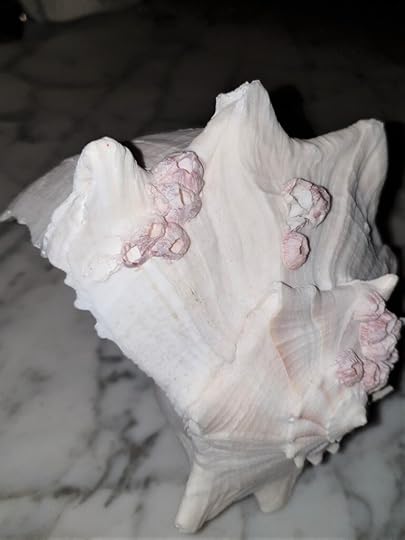
At the airport, I had assistance, occasionally my walking is not very good, and I like to be safe. I was pushed in a wheelchair by Juan, a very nice Mexican young man with rather limited English, and we went through various checks. It was OK, they spoke in Spanish, so I didn’t know what they talked about, but they all seemed happy. I needed so many papers- passport, Mexican landing certificate, ESTA, Vaccination certificate, Covid test certificate.
I don’t know if Mexicans just don’t like talking to Gringos in their language, but I was surprised how even at the airport, knowledge of English was not commonplace. When I went through security, a female officer opened my carry-on bag, and looked through everything, taking things out. She found the shell ( the other shells were packed in the checked in luggage).
I don’t speak Spanish, but with learning Latin and French, I understand a bit.
She started telling me in fast Spanish that I can’t take the shell to the plane. At first, I thought it was not allowed to export the shells. She spoke very fast, and I slowly asked her if anybody “ habla inglese”.
After carrying on speaking Spanish for another minute, she eventually called a colleague who spoke English and he explained to me that there are sharp edges.
“It’s dangerous!” he said. Being a crazy writer, I immediately imagined somebody hijacking a plane using a large seashell as a weapon. It would make a good story.
They thought I was going to leave the shell behind. Little did they know me!
Juan couldn’t believe it when said that I will check in my carry-on luggage .He wheeled me back through all those checkpoints, but when I was told it would be 100 US$, I said that was too much.
I was going to say goodbye to my beautiful seashell ,when the kind woman who checked my regular luggage in half an hour before suggested, she can have it brought back so that I can pack the shell in the checked in luggage.
So there was me, in the middle of Merida airport kneeling on the floor, re-packing two cases, while everybody was having a great time observing that crazy Gringo. They all quite obviously thought I was amusingly mad. Or is it madly amusing? Probably both.
I had to go through security again, but they didn’t bother checking my luggage. I looked at my phone for how to say in Spanish ” crazy grandmother”.
“Yo soy abuela loca.” I told Juan. He laughed.
I think they are probably still laughing about that Gringa loca! Well, I aim to amuse.
January 29, 2022
January 23, 2022
Series of videos about 2 very different books
Here is first of a series about Pat Black Gould soon to be published book about a Jewish girl hiding in a monastery and about my novel ” Why Didn’t They Leave?
We are recording the series in honour of the Holocaust remembrance day on 27th January
Here is one of Pat’s book illustrations.
 [image error]
[image error]
December 31, 2021
Happy new year to read and write.
Nice start to the year.
 We’re glad you’re reading.
We’re glad you’re reading.Happy new year to read and write,
to fill and crown the previous years feats
by striving and doing what’s just right.
There’re things that may bear some light
to everyone everywhere that knows it’s
happy new year to read and write.
Don’t be upset, don’t with yourself fight:
many have succeeded in other life’s beats
by striving and doing what’s just right.
Write well, dear, but don’t just write;
read, compliment others on their writes:
happy new year to read and write.
Follow others and explore their dre’light:
success is not by quiets and fights, it’s
by striving and doing what’s just right.
Be kind and gentle, if truly you believe it
is a moment to grow and reach heights.
Happy new year to read and write
by striving and doing what’s just right.



That’s our happy new year villanelle ‘trial’ poem for…
View original post 19 more words
It will never happen again, right? We will not allow it.
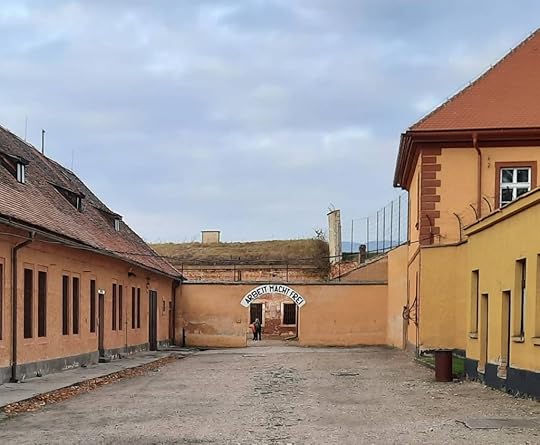
This my last blog in 2021. It is a sad one and it summarises my Autumn. I am making a full stop. My novel “ Why didn’t they leave?” is about the painful 20th century history, The Holocaust, emigration, totalitarian system.
I am now writing a different book, not about Holocaust. It might even be funny.
My son bought an old book in a second-hand bookstore in Prague. The book- “Small tress in Theresienstadt ” was published in 1950 in Czech in Prague.
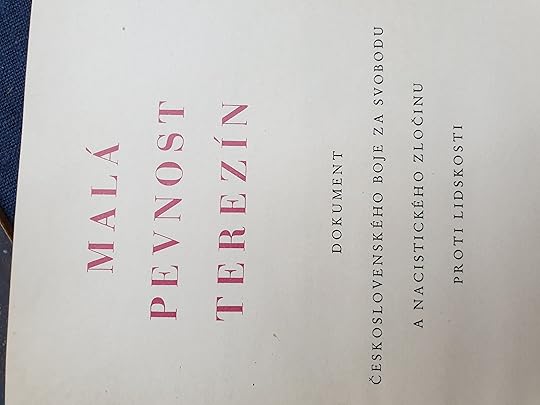
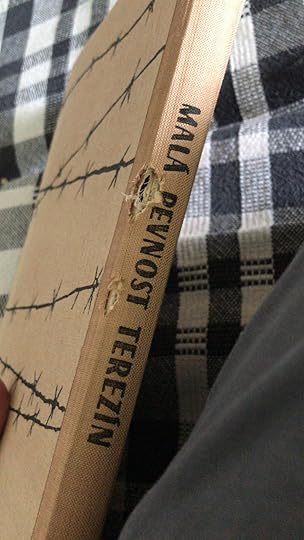
The book my son bought was written only 5 years after Theresienstadt was liberated . It is written in a simple journalistic style, without emotion. It is a testimony.
Of course, the book was published at the height of Stalinism, and there is a lot of communist Stalinist propaganda, mainly in the introduction and summary.
1950. My mother and grandmother by then stopped hoping that some relatives might still be alive. They never said “ they were murdered” they used to say :
“They didn’t come back”
The book was shocking.
The description of torture, murder with the aim to make the death as painful as possible, the cruelty … It was almost unbearable to read.
Beating, making prisoners starve, humiliating torture, prisoners dying a slow painful death…
It would be awful to read even if it wasn’t personal.
For me, it is personal, my grandfather and my mother’s brother died there, my uncle being beaten to death by the SS. He was only 20 years old.
The cruelty was unbelievable. Making prisoners kill each other, starving them for 3 days, then giving them very salty soup to eat and no water for another 3 days, killing them by beating and kicking, the atrocities go on and on. The commander killing a bleeding prisoner lying on the ground by stepping at his neck, with the spine crunching under his boot…
I almost stopped reading; it was too upsetting. I went for a walk to look at the Stolpersteine we put in the pavement in front of the house my family used to live before their deportation to Theresienstadt.
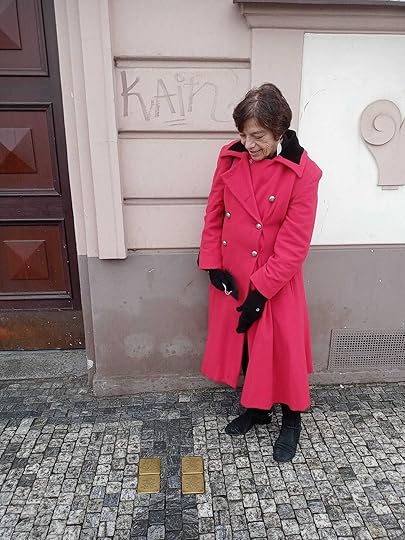
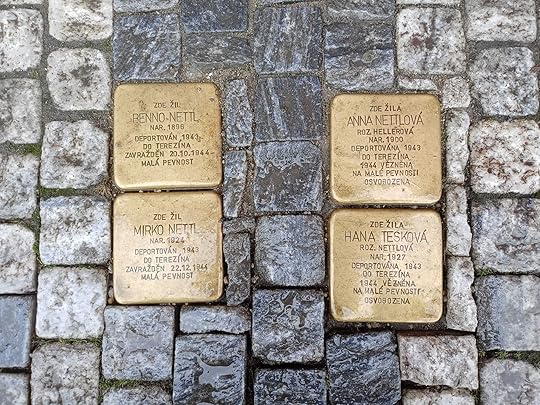
One of my grandson was named after my grandfather. So there is now another Benno. A happy one year old boy who will hopefully never encounter the antisemitism and violence his great- grandfather., He will be happy, equal and would be told about people being equal, and will not see the hate, discrimination, that is unfortunately still happening in some parts of our world.
He won’t see war, and the family history in 1938-1945, or even in the postwar years till 1989 will be just like a nightmare that will never happen again.
He won’t get into a situation when his grandson will wonder why his grandparents didn’t he leave. No member of my family will ever need to ask that question.
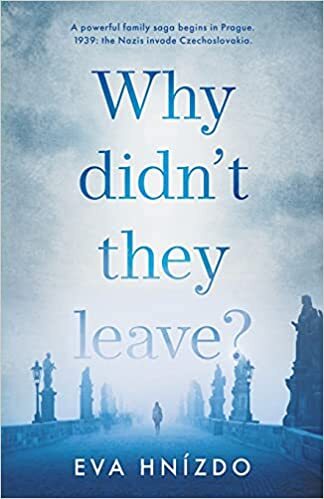 [image error]
[image error]The names on the Stolpersteine are there to remind us. The names of those cruel SS guards should be forgotten. Or maybe not? NEVER AGAIN, we say. Let’s hope we are right,
December 21, 2021
Smorgasbord Christmas Book Fair – #Historical Eva Hnizdo, Andrew Joyce – #SciFi – Thorne Moore, John L. Deboer
Thank you for writing about my book and providing so many wonderful blogs.

Welcome to the Christmas book fair and today a combination of historical and science fiction novels.
The first author today who recently joined the cafe and bookstore is Eva Hnizdo with her debut novel, released in September. The historical Jewish fiction Why Didn’t They Leave?
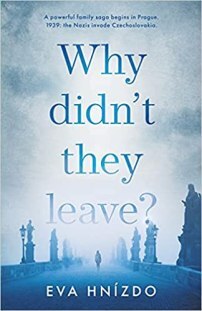 About the book
About the book
You can’t ask for asylum in another country just because your mother drives you nuts, so when 19-year-old Zuzana flees from communist Czechoslovakia to England in 1972, she says she just wants freedom. Her relationship with her mother, Magda – a Holocaust survivor who lost most of her family in the concentration camps – is toxic and Zuzana finds happiness in London with a loving husband and beautiful son. But when her mother dies, Zuzana is crushed by guilt and feels an overwhelming urge to discover more about her family’s tragic history. So, she embarks on a life-changing journey, discovers some incredible…
View original post 1,424 more words
December 19, 2021
Musing about book success- does it matter? Yes , but it is not the reason I write.

I am reading Steinbeck’s Winter of our Discontent. I like Steinbeck, his East of Eden being my favourite of his books. In fact one of my favourite books by any author.
I googled his books and him and read about his 1962 Nobel Prize for literature. To my surprize, there was a lot of criticism about him getting the Nobel prize. The archives apparently say he was chosen as the best of a bad lot.
“There aren’t any obvious candidates for the Nobel prize and the prize committee is in an unenviable situation,” wrote committee member Henry Olsson.
Reading all this made me realise how even great authors get bad reviews, and people who don’t understand their work. Somehow, I thought the great ones were not vulnerable. They are.
Success in art is weird. I am sure there are brilliant books out there that never get published, or if they do, they sink. There are also not so brilliant books that are successful.
The taste of readers varies, and critics look smarter when they condemn rather than tan praise.
And of course, I am no Steinbeck. My book has good and bad reviews, more good ones so far. Finding out even the great ones get bad reviews helps.
And even if my book sinks, I loved writing it, it helped me to understand my life better, and it gave and continues giving some readers pleasure. If I rewrote it, it would be better, I have learnt a lot since in various workshops, and by writing. I am writing a new novel. I don’t know if it will be better or not. It’s different. Maybe it will be a bestseller, maybe not.
But I know that writing is my new job, a job I love like I loved my job as a doctor. I am lucky.





